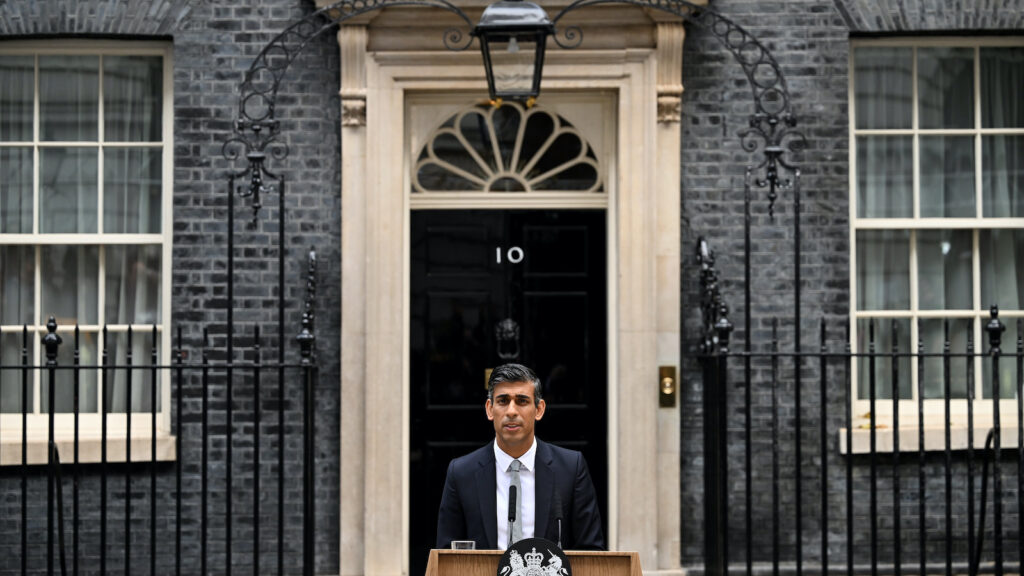How Well-Positioned Is the UK Economy to Recover From COVID?

A pedestrian wearing a face covering walks in central London. People are going to go to the office less and business travel is going to decline — that's going to have a significant effect on the economy.
Photo: Tolga Akmen/AFP via Getty Images
In the last year, the U.K. economy has been hit by both the pandemic and Brexit. On top of that, the U.K. has a legally binding target of becoming net zero in carbon emissions by 2050, which will require significant structural change to the economy.
Alex Chapman is a senior researcher at the New Economics Foundation in the U.K. BRINK asked him for his assessment of where he thinks the U.K. economy is likely to go over the next two years.
CHAPMAN: The pandemic marked the end of a period of 10 years of public austerity in the U.K., with a particularly low level of state benefits and other social protections compared to most of our European neighbors. Adult participation in education has also been at a three-decade low, and there is pretty stagnant economic growth as a result of Brexit. So, in many respects, we are not well prepared for the structural changes that are needed.
The U.K. is now committed to moving to a zero carbon economy. There’s still debate about exactly how fast that needs to happen and exactly how deep the structural change involved will be, but the country has committed to that in legislation, and change is therefore coming.
The one thing that puts us in a slightly more favorable position is the existence of historically low interest rates, which has given the government a huge amount of breathing room in terms of being able to invest and to borrow.
Permanent Job Losses
BRINK: Has the pandemic accelerated structural unemployment?
CHAPMAN: Yes, absolutely. There’s pretty broad agreement now that some of the changes we’ve seen from the pandemic will be permanent. People are going to go to the office less, business travel is going to decline, potentially the services around office space and supporting services might decline as well. And that’s going to have a significant effect on the economy.
Our analysis, based on the Office of Budget Responsibility’s estimates of structural employment, suggests we’re looking at potentially around 500,000 people directly losing their jobs in sectors where their job is now permanently gone, as opposed to jobs that might come back as the recovery unfolds. This means that these workers are potentially going to have to make some kind of occupational sector shift.
That’s just the COVID impact, before we even talk about the climate crisis, Brexit, and of course, long-term automation, which is another structural shift in the economy.
The Need for Big Structural Shifts
BRINK: With regard to the path to net zero by 2050, how quickly do you expect those changes to occur?
CHAPMAN: Some of the biggest shifts have to happen over the next two to five years, particularly in terms of retrofitting buildings and housing. To do that, you need to upscale a very significant construction sector, alongside the renewable energy workforce, which is already underway.
That’s good news for people already at work in the construction and retrofit industry, but there’s going to need to be a huge expansion. Potentially, we could be talking about 50% growth.
Whether we’re talking about the pandemic recovery or the climate crisis, the key thing to bear in mind is that the cost of not investing in these issues is far greater than the cost of investing.
We see similar trends in the electric vehicle rollout. The government’s got targets around phasing out diesel and petrol vehicles, which means, again, huge investment in electric vehicle infrastructure, electric vehicle manufacture, etc. This requires a structural shift in the economy as well, albeit potentially slightly less significant than the one in housing and building retrofit.
To prevent climate breakdown, the shift to zero carbon needs to happen quickly, but we can’t lose sight of the welfare of workers in sectors affected by such a transition and their need for good quality, stable employment.
BRINK: Will there be requirements to radically overhaul the sources of income and taxes to pay for this?
CHAPMAN: Well, whether we’re talking about the pandemic recovery or the climate crisis, the key thing to bear in mind is that the cost of not investing in these issues is far greater than the cost of investing.
A lot is being made in the U.K. at the moment about the size of our debt as a ratio to GDP. But I think a lot of that is essentially scaremongering or a poor understanding of the economic context that we’re in, which is one of extremely low interest rates, where the Bank of England is essentially covering most of the government’s debt.
If interest rates start to rise, the only scenario where that’s likely to happen is where we’ve actually got good rates of economic growth returning. So the economy would be getting bigger at that point and, therefore, able to carry more of the costs of interest-rate rises. So, we don’t see significant fiscal risks, if you like, to greater levels of public spending.
Economic Inequity
BRINK: Do you think all this change will result in a more equal economy? Will that also be a side benefit of this structural adjustment?
CHAPMAN: It’s a vital question, because we know that more equal economies are generally more productive. But there’s certainly no guarantee that the recovery that we’re now going to go through will improve what has been a rapidly worsening situation of social inequality in the U.K. over the last 10 years.
There’s some people who aren’t very mobile in the labor force. There are people who, if they lose their job in one place, because of housing prices and rent prices, can’t relocate to where the jobs are. And there’s people who can’t afford to cover their living costs while they go through education and training and upskilling.
And a key thing to remember is that the industries of the future, the green industries that we’ve been talking about, are industries that have typically been heavily dominated by certain demographic groups. The construction sector, for example, which is likely to receive a lot of investment through the COVID recovery phase, is an extremely white male-dominated industry.
Government Reactivity
One last point is that of the government’s strategy so far and how reactive it’s been. The government has been extending deadlines every three months, and then the deadline always shifts. That means businesses are finding it extremely difficult to know what’s going to come next.
We had the job retention bonus that was going to be given out to firms; that was quietly scrapped. We had the Green Homes Grant scheme, which was going to create tens of thousands of jobs and kickstart the recovery; that scheme has now been dramatically scaled back.
What businesses are crying out for is certainty and a skilled and mobile workforce, and the structures are not enabling that at the moment.







